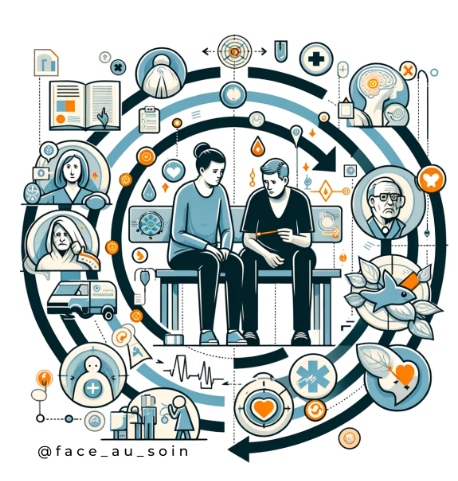Scanxiety in caregivers: understanding and managing medical-exam related anxiety
Published Feb 3, 2024 • By Sarah Moreau
Behind the scenes of the healthcare journey, a little-known but poignant issue looms large for carers and their loved ones: scanxiety. Today, we take a look at the deep-seated apprehension that accompanies medical examinations, deciphering its roots, its consequences, and the approaches to quelling it.
It would be an illusion to claim that this anxiety, which is specific to scans, can disappear, and it varies from person to person. Our approach is to shed light on its underlying causes, so that you can accept it without judging yourself, and even discuss it openly with your family and friends.

What is scanxiety?
In the health journey's backstage, an obscure yet poignant challenge emerges for caregivers and their loved ones: scanxiety. Today, we delve into the depths of this profound apprehension that accompanies medical exams, decoding its roots, consequences, and approaches for taming it. Claiming that this scan-specific anxiety can vanish would be fanciful and varies from person to person. Our goal is to shed light on its fundamentals, so you can accept it without self-judgment and even discuss it openly with your loved one and those around you.
Scanxiety, a term that merges 'scan' and 'anxiety', describes the anxiety caregivers feel regarding their loved ones' medical exams. This anxiety is often heightened by the waiting and uncertainty surrounding the exam results.
Although it's a common experience for many caregivers, scanxiety's lack of recognition can be attributed to two main factors:
- In the healthcare system, the primary focus is on the patient, which can lead to the neglect of caregivers' emotional needs.
- There's a general lack of awareness about the specific emotional challenges caregivers face. At times, caregivers themselves may downplay their feelings, focusing on the patient's well-being at the expense of their mental health.
Research in health psychology has begun to shed light on this phenomenon. A study published in the 'Journal of Clinical Oncology' investigated the impact of scan-related anxiety on caregivers of cancer patients. The findings indicated that this anxiety could be as high or even higher than that of the patients themselves, significantly affecting the caregiver's quality of life.
Scanxiety can profoundly impact caregivers' mental health and well-being. It can manifest as stress, insomnia, irritability, and even lead to depressive symptoms. The constant anxiety about exam results can create a state of ongoing tension, negatively influencing the caregiver's quality of life.
Is Scanxiety Related to Post-Traumatic Stress (PTSD)?
Scanxiety and post-traumatic stress (PTSD) share common roots in how we react to stressful and potentially traumatic events. Scanxiety, specific to the intense anxiety experienced before, during, and after medical exams, is often triggered by the anticipation of a negative result and the fear of the unknown. Like PTSD, it can cause symptoms such as hypervigilance, flashbacks of past experiences, and a strong emotional response to reminders of the illness.
PTSD, on the other hand, occurs after an event perceived as traumatic and can involve persistent symptoms of re-experiencing, avoidance, and hyper-arousal. For caregivers, repeated confrontations with stressful medical situations can resemble repeated trauma, particularly when each scan recalls the vulnerability and suffering of their loved one, leading to emotional reactions like PTSD.
When Can Scanxiety Occur?
Scanxiety can manifest at various points in the care journey, and as caregivers, you're particularly prone to experiencing it at these key stages:
- Before Scans: The anticipation of exams can be a source of great anxiety, with apprehension about the results and what they could mean for your loved one's future.
- During the Wait: The moments spent in the waiting room or during the exam itself can be particularly stressful, as you find yourself in uncertainty and helplessness.
- After the Exams: Even after the scans are done, waiting for the results can trigger intense anxiety as you ponder the next steps and decisions to be made.
- Upon Receiving Results: Whether the news is good or bad, receiving results is a moment when scanxiety can peak, as it directly confronts the reality of the situation.
- Between Scans: The period between scheduled scans is often marked by latent anxiety, where concern for your loved one's health can constantly occupy your thoughts.
To manage scanxiety, it's important for caregivers and their loved ones to adopt proactive strategies to recognize this fear. Here are some suggestions:
- Information and Preparation: Understanding the medical exam process and openly discussing it with healthcare professionals can lessen the worry associated with the unknown.
- Relaxation Techniques: Methods like meditation, yoga, or deep breathing can help alleviate anxiety.
- Emotional Support: Joining support groups or talking to a mental health professional can provide a space to express and manage these difficult emotions.
- Self-Care: It's crucial that caregivers take time for their well-being, whether through hobbies, physical activities, or just moments of relaxation.
- Get Moving by Establishing a Routine: Moving is a proactive strategy for caregivers facing scanxiety. Physical exercise, by promoting the release of endorphins, helps reduce anxiety and stress. A routine of activity, whether gentle like walking or more intense, not only maintains physical fitness but also instills a sense of control and reassuring routine in the often unpredictable daily lives of caregivers.
How to Communicate with Your Loved One about Scanxiety?
We are all different, and it's possible that the anxiety felt is not shared with your ill loved one, and vice versa.
To navigate through scanxiety, it's essential to verbalize and explore both your emotions and those of your loved one. Ask key questions:
- "How do you feel before, during, and after medical exams?"
- "Do you wish to talk about your worries, or would you rather focus on something else to find relief?"
- "Where do you feel the anxiety in your body, and how does your loved one experience it?"
- "Are there times when your anxiety lessens? What contributes to these moments of calm?"
Each individual reacts differently to the stress associated with medical care. It's natural for you and your loved one to have distinct experiences. Try to accept these differences without judgment.
Conclusion
Recognizing and addressing scanxiety is an important step for caregivers. By understanding this phenomenon and practicing compassion towards oneself, caregivers can not only improve their mental health but also be more present and effective in their caregiving role. This fear may not disappear, but legitimizing and validating it can be liberating.

Take care!
Sources :
“Scanxiety” and a sense of control: the perspective of lung cancer survivors and their caregivers on follow-up - a qualitative study, Katharina Seibel, Barbara Sauer, Bernd Wagner, and Gerhild Becker
“The Oizys Study”: Prevalence and impact of scan-related anxiety on QoL among Greek cancer patients and their caregivers, Filippos Koinis, Vasiliki Leontopoulou, Evangelia Chantzara, and Athanasios Kotsakis
Comments
You will also like

Spoon theory: What is it and how can it help people living with chronic illness?
Apr 13, 2022 • 6 comments

What is the psychological impact of chronic pain? Carenity members share their experience!
May 27, 2021 • 8 comments

 Facebook
Facebook Twitter
Twitter
